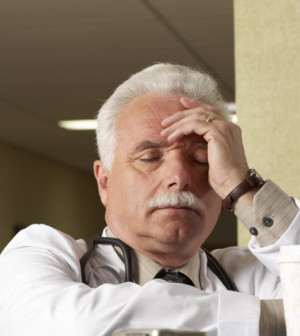- 10 Strategies to Overcome Insomnia
- Could Artificial Sweeteners Be Aging the Brain Faster?
- Techniques for Soothing Your Nervous System
- Does the Water in Your House Smell Funny? Here’s Why
- Can a Daily Dose of Apple Cider Vinegar Actually Aid Weight Loss?
- 6 Health Beverages That Can Actually Spike Your Blood Sugar
- Treatment Options for Social Anxiety Disorder
- Understanding the Connection Between Anxiety and Depression
- How Daily Prunes Can Influence Cholesterol and Inflammation
- When to Take B12 for Better Absorption and Energy
Sleepwalkers Feel No Pain When Injured: Study

Some sleepwalkers don’t feel pain when they suffer an injury — even a severe one — during a sleepwalking episode, a new study finds.
But sleepwalkers are at increased risk for headaches and migraines when they’re awake, the researchers added.
The researchers assessed 100 sleepwalkers and a control group of 100 people with normal sleep habits, and found that the sleepwalkers were nearly four times more likely to suffer headaches and 10 times more likely to suffer migraines.
Among the 47 who had suffered at least one injury during sleepwalking, 79 percent said they did not feel pain at the time and remained asleep despite the injury, according to the study in the November issue of the journal Sleep.
“Our most surprising result was the lack of pain perception during the sleepwalking episodes,” principal investigator Regis Lopez, a psychiatrist and sleep medicine specialist at Hospital Gui de Chauliac in Montpellier, France, said in a journal news release.
This is the first study to find that some sleepwalkers do not feel pain, according to Lopez.
One patient suffered severe broken bones after jumping out of a third-floor window while sleepwalking, but did not feel the pain until waking up. Another patient broke his leg while sleepwalking onto the roof of his house and falling off, but did not wake up until morning.
“Our results may help to understand the mechanisms of the sleepwalking episodes,” Lopez said. “We hypothesize that a dissociate state of arousal may modify the components of sleep-wake behavior, consciousness, and also pain perception.”
Sleepwalking affects up to 4 percent of adults, according to the American Academy of Sleep Medicine.
More information
The U.S. National Library of Medicine has more about sleepwalking.
Source: HealthDay
Copyright © 2026 HealthDay. All rights reserved.










